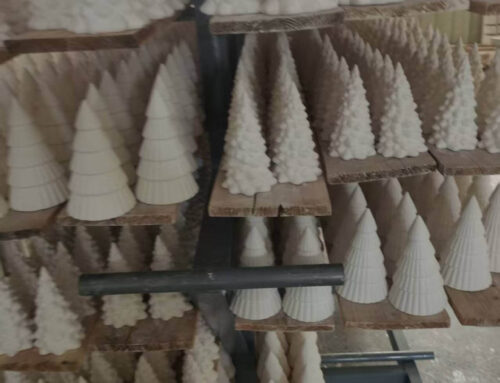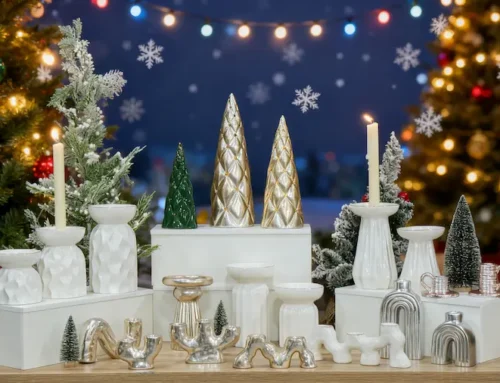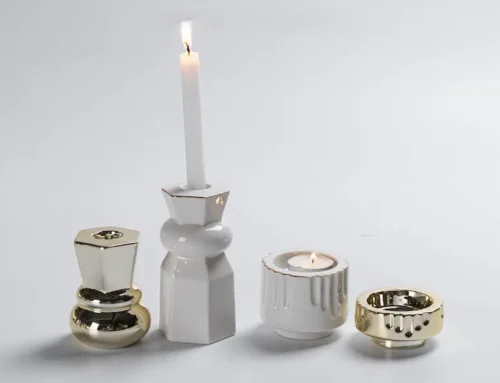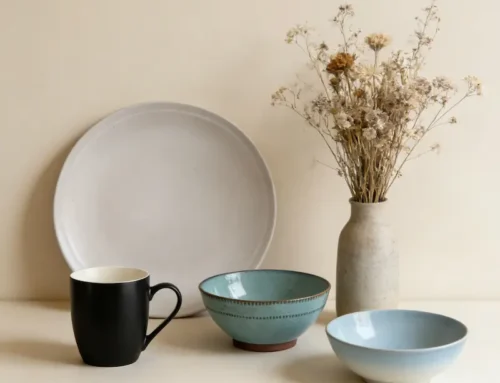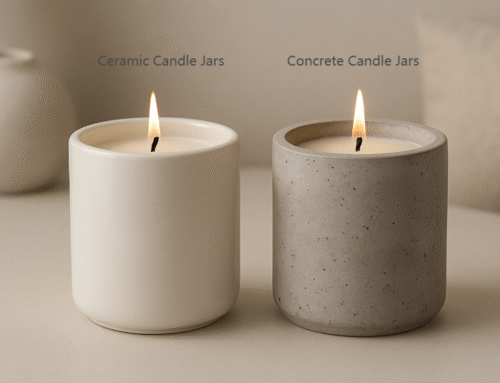Looking for ceramic candle jars wholesale in the UK? At Homey Ceramic, we supply premium-quality candle jars directly from our factory in China to UK brands, candle makers, and wholesalers. Our range includes a wide choice of sizes, colours, and finishes—ideal for luxury candles, eco-friendly ranges, or custom-designed jars that help your products stand out in the competitive UK market.
We know UK buyers care about both quality and flexibility. That’s why we offer low MOQ orders, custom logo printing, and tailored packaging solutions. With years of experience exporting to the UK, we guarantee safe packaging and reliable shipping so your orders arrive on time, every time. Whether you’re a small independent candle maker or a large distributor, our wholesale ceramic jars are made to fit your needs.
The demand for ceramic candle jars in the UK is stronger than ever. The UK home fragrance market was valued at around $685.5M in 2023 and is expected to nearly double by 2030, with scented candles driving much of the growth. In 2021–2022 alone, UK consumers spent roughly £418M on candles, and over 90% of households bought at least one for home wellness. Now is the perfect time to upgrade your collection with durable, stylish ceramic jars that appeal to UK buyers.
UK Home Fragrance Market Trends
The British home fragrance market is surging. Analysis by Grand View Research notes UK revenues growing at over 8% per year, and scented candles topping the charts. This boom is driven by trends like “home sweet home” décor, wellness, and self-care. After the COVID lockdowns, customers renewed focus on cozy, aromatic living spaces (candles fit this perfectly). Even with cost-of-living pressures, the allure of transforming a room with scent is holding strong. As an industry report puts it, “lockdowns… have led to an increased focus on the home and trends like wellness. Candles fit in with these trends by providing ambience-enhancing… fragrance”.
Meanwhile, UK retail data underscores this appetite. Popular retailers have noted double-digit rises in candle sales over recent years, especially in more affordable lines. Consumers now expect high-quality yet stylish candle vessels – and ceramic candle jars deliver on both fronts.
Why Ceramic Jars Are Trending
Among all candle containers, ceramic candle jars are standing out. They tap into consumer desires for natural, artisanal home décor. Ceramics offer an elegant, practical feel – many buyers describe ceramic candles as having a “natural, handmade feel” that fits luxury and “hygge” styles. Made from natural clay, ceramic jars look and feel premium: they are “elegant and long-lasting”. In fact, ceramic material is durable, heat-resistant and adds a premium feel to candles. This combination of beauty and solidity makes ceramic jars ideal for gift sets and high-end ranges. With buyers increasingly eco-conscious, ceramic’s natural origins give it an extra appeal over petroleum-based alternatives.
In short, ceramic candle holders resonate with UK consumers seeking stylish, sustainable décor. As one source notes, “ceramic containers add a premium feel… [and] their elegant look enhances the value of the candle”. That premium, handcrafted vibe is why ceramic has risen above metal tins or plain glass for many UK shoppers.
Advantages of Choosing Ceramic Candle Jars
Ceramic jars bring several advantages over glass or metal containers. These benefits help explain why UK retailers and brand buyers increasingly specify ceramic candle jars in their wholesale orders:
-
Aesthetic Appeal:
Ceramic candle jars are often the most beautiful and luxurious vessels available. They come in a rich variety of shapes, colors and textures (matte, glazed, patterned, etc.) that can enhance any décor style. Many ceramic jars are highly decorative by design, adding elegance to a room long after the candle is burned out. The image below illustrates how ceramics pair classic beauty with candle function – such vessels can double as décor pieces themselves.
Ceramic candle jars often feature rich textures and unique designs. These luxurious containers enhance décor – many can even be repurposed as decorative planters or storage jars after the candle is used.
-
Durability and Performance:
Unlike thin tin or cheap glass, ceramic is inherently durable and heat-stable. Ceramic jars can withstand high temperatures without warping or cracking, which helps candles burn more evenly and last longer. For example, ceramic’s strong thermal insulation keeps the candle’s heat contained – extending burn time and preventing overheating of surrounding surfaces. In practice, this means customers get a cleaner, steadier flame. Wholesale buyers prize this safety and performance advantage: ceramic jars help minimize breakage (during shipping and use) and deliver a premium feel when lit.
-
Eco-Friendliness and Reusability:
Ceramic is made from natural clay, a sustainable material, and many clay jars can be cleaned and reused. Buyers concerned with sustainability appreciate that ceramic candle jars can often be repurposed as plant pots, storage containers, or decorative holders when the wax is gone. (See, for example, an aromatherapy setup below with a jar candle alongside other wellness accessories.) Using recycled or reusable containers aligns with current eco-friendly buying trends: as one industry guide notes, “all packaging on the European market should be reusable or recyclable by 2030”. In short, ceramic jars tick the boxes for a premium look and a green footprint.
Ceramic candle vessels fit naturally into wellness and eco-conscious trends. Made from clay and often heat-resistant, they can be reused or repurposed (for example, as plant pots or diffusers) after the candle burns down.
Each of these factors – style, durability, sustainability – helps ceramic candle jars command attention in the UK wholesale market. They offer a clear value-add for fragrance and décor brands that want to stand out.
The Process of Wholesale in the UK
Bringing ceramic candle jars into the UK in bulk involves familiar steps for any home décor importer. A typical import and distribution process looks like this:
-
Selecting Suppliers:
UK wholesalers usually source from established pottery and glasswork regions abroad. China remains a major hub – supplying about 34% of the UK’s candle container imports – followed by European neighbors like Poland, Czech Republic, and growing Asian producers (Vietnam ~13%). To find suppliers, UK importers often attend trade shows (e.g. the Spring Fair in Birmingham) or browse B2B platforms. Many use directories like Europages or Global Sources. Whether working with factories directly or through agents, buyers verify the quality and compliance of the jars. It’s important to discuss certification (food-safe, lead-free glazes) and request samples before committing to full orders. Since Brexit, UK buyers increasingly import directly from overseas factories (avoiding EU intermediaries) to cut extra fees.
-
Placing Orders:
Once a supplier is chosen, the buyer specifies jar designs (size, color, lid style) and any customization needed. Many UK brands want customised candle jars with logos or unique shapes. Reputable suppliers – especially ones geared to export – will offer design support and prototyping. Purchase orders usually involve large quantities (often in the thousands) on FOB or CIF incoterms. Lead times for ceramic production can range from a few weeks to a couple of months, depending on complexity. Payment terms might be by telegraphic transfer or letter of credit, typically 30-50% upfront.
-
Logistics and Shipping:
Most ceramic jar imports travel by sea. Buyers work with freight forwarders to arrange full or partial container loads (40ft or 20ft), depending on volume. UK major ports for containers include Felixstowe, Southampton, and Liverpool. Importers prepare shipping documents (commercial invoice, packing list, bill of lading) and ensure the commodity code is correct (ceramic household articles generally fall under HS chapter 6912). UK law requires businesses to have a GB EORI number to clear goods through customs. On arrival, the goods may incur tariff duty and import VAT (for ceramics, duties are usually in the low single digits, but buyers should check the UK Global Tariff). Once cleared, containers move to a warehouse or distribution center.
-
Customs and Compliance:
After Brexit, UK importers must follow UK-specific regulations, though these often mirror EU rules. For candle jars, essential checks include material safety and labeling. Any fragrance products will need CLP/UKCLP safety labels, but blank jars themselves are covered by general product safety standards. Buyers should verify that suppliers comply with chemical restrictions (e.g. UK REACH). Proper packaging is also needed for transit – ceramic goods must be cushion-packed to survive handling.
Throughout this process, communication and planning are key. Strong UK wholesalers stay on top of logistics, maintain buffer stock in case of delays, and work closely with suppliers (often in China or EU) to manage quality and timing. By understanding these steps – from sourcing to customs – UK distributors can build a smooth supply chain for ceramic candle jars.
Key Considerations for Wholesalers
Once sourcing ceramic jars, distributors must juggle several practical factors to succeed in the competitive candle market:
-
Quality Control:
Rigorously inspect each batch of jars. Check for uniform size/shape, correct color glazing, and absence of cracks or chips. Have the supplier provide test reports (for example, lead content in glazes). Many UK buyers also perform their own checks or audits of foreign factories. Good quality control ensures that candles fill properly and burn safely. Remember that European clients especially expect compliance with EU/UK safety standards; failures (even cosmetic) can lead to returns and damage your reputation.
-
Pricing Strategy:
Accurately calculate the landed cost of jars. This includes the factory price, international freight, duties, VAT, and any testing or shipping costs. Wholesalers then set a wholesale price with a healthy margin. Keep an eye on competitors – for example, some buyers source plain ceramic jars cheaply and focus margins on wax and scent. You might position your offering as premium (justifying a higher price) or as value/bulk. The UK market has room for both (mass-market retailers and luxury boutiques). Knowing your cost structure means you can negotiate container loads effectively (often the cheapest per-unit rate) and still offer volume discounts to retailers.
-
Handling MOQ (Minimum Order Quantity):
Ceramics factories often have high MOQs (hundreds or thousands of units per SKU). Smaller UK companies sometimes struggle with such large minimums. To manage this, you can consolidate orders (mix different jar designs in one container) or work with suppliers who offer lower MOQs. Some overseas suppliers (like Homey Ceramic) pride themselves on flexible, low MOQ options to accommodate boutique brands. Negotiating MOQs can open the market – a supplier willing to split orders or provide sample mini-batches can become a preferred partner.
-
Storage and Logistics:
Ceramic jars are heavy and fragile. Plan adequate warehousing with sturdy shelving and protective packing. Factor in extra handling space and padding. Large jar orders can consume significant cubic meters, so optimize container loads (stacking and protective bracing is crucial). If jars arrive broken, costs add up fast. Consider warehousing solutions in the UK that specialize in breakable goods (pallet racking with foam, etc.). Also keep seasonality in mind – retailers often stock up for Christmas and holiday seasons, so inventory timing matters.
-
Customer Preferences:
Stay tuned to what end-consumers want. UK trends tend to favor neutral or nature-inspired looks: e.g. earthy textures, botanical motifs or minimalist matte finishes. (Retailers often say that candles with a “green”, natural vibe do especially well.) Offer both classic and on-trend designs. Recall that added value sells: joint UK-EU industry advice suggests consumers pay more for candles with special ingredients, craftsmanship, or gift packaging. In practice, this means customized branding and unique jar shapes can help your customers stand out. For example, if a UK retailer is targeting a wellness theme, jars that double as plant pots or ceramic holders fit the bill. Always survey your market: do clients in the UK want plain white jars for labeling, or colored/glazed artisan vessels? The answers will guide your stock and ordering decisions.
By minding these considerations – from rigorous QC to smart pricing and stocking – wholesalers can build a reliable ceramic candle jar business. The goal is to balance cost, quality, and market appeal so that retailers and end-customers both feel they’re getting the right product.
Market Outlook and Future Trends
Looking ahead, the ceramic candle jar sector in the UK is poised to grow further, shaped by innovation and regulation:
-
Growth Forecasts:
Analysts predict continued expansion of home fragrance, even in a mixed economy. The drive for home comfort and self-care shows no sign of abating. A rising middle class and ongoing wellness trends support steady demand. One research firm notes that, in Europe, candle imports from developing countries have surged (nearly doubling between 2018 and 2022), implying that markets like the UK still have appetite for new products. With holiday gifting and special occasions (like Mother’s Day and Christmas) each year boosting candle sales, smart wholesalers can expect sustained opportunities, particularly if they offer fresh designs.
-
Design and Material Trends:
A few clear trends are influencing candle jar styles. Sustainability is now a table-stakes theme: eco-friendly materials and multi-use designs are on the rise. For example, jars that can be refilled or repurposed resonate with consumers – this fits into the broader “circular economy” push where by 2030 all packaging should be recyclable or reusable. We’re already seeing suppliers experiment with recycled-content ceramics and reusable lids. Aesthetically, textured glazes, earthy tones and minimalist shapes remain popular, reflecting broader interior design trends. Some brands are even introducing refill stations or candle subscription models, which may ultimately favor durable ceramic holders over disposable glass.
In terms of fragrance synergy, recent UK commentary points to a shift from floral notes to deeper, woodier, nature-inspired scents. Ceramic jars pair well with these earthy themes (think handcrafted pottery vibes). Additionally, there’s an emerging niche for novelty or artisanal jars – e.g. sculptural shapes, hand-painted surfaces or locally-inspired designs – as consumers seek Instagrammable home accents. Wholesalers should watch design trends closely: smooth IKEA-esque pastels have given way to organic, imperfect finishes. The “flawsome” movement (celebrating imperfect, handmade products) suggests that slight irregularities in ceramic can even be a selling point.
-
Sustainability and Regulation:
Regulatory pressures will shape the market. In Europe, new rules aim to curb packaging waste: under the EU Circular Economy plan, all packaging on the market must be reusable or recyclable by 2030. Buyers may soon demand fewer plastic bags or foam from their suppliers, and prefer jars with minimal secondary packaging. (The UK is expected to adopt similar measures under its own extended producer responsibility (EPR) schemes.) Wholesalers should anticipate these changes – for example, by sourcing jars with simpler, eco-friendly packaging or by highlighting that their products meet such standards.
At the same time, forthcoming EU legislation (and likely UK equivalents) will target sustainability claims. The new Green Claims Directive aims to prevent misleading “eco” marketing. This means you should be prepared to back up any green claims about your jars (e.g. “100% recyclable”, “biodegradable”) with evidence. In practice, partnering with a supplier who can certify the source and recyclability of clay can be a competitive advantage.
Lastly, global factors like commodity costs and logistics remain wildcards. Reports note that disruptions from COVID recovery and the Ukraine conflict have driven up costs of raw materials and transport. Wholesalers should build some flexibility into pricing to handle possible fluctuations. However, these headwinds may be offset by consumers’ hunger for affordable luxury at home – so there’s likely still room for innovative ceramic products at various price points.
In summary, future demand for ceramic candle jars in the UK looks strong but will require agility. Buyers must keep an eye on evolving design tastes and tightening sustainability rules. Those who adapt – for instance by stocking trendy colours or eco-optimized packaging – will be best positioned to grow with the market.
Why Partner with Homey Ceramic
For UK distributors seeking a reliable ceramic candle jar supplier, Homey Ceramic is a strong partner. Homey offers customised ceramic candle jars tailored to your brand’s needs – from unique shapes and lid designs to logo printing – so you can differentiate your product line. Key advantages include:
- Customisation Options: Our in-house design team can work with you to create bespoke jar styles or finishes. Want a specific color glaze, embossed logo or special lid? Homey accommodates such requests, even on small sample orders.

Christmas Tree Ceramic Candle Holder

Custom Ceramic Candle holder
- Low MOQ: Unlike many factories, we offer low minimum order quantities,from 100pcs to 500pcs. This flexibility lets you test new designs without committing to huge volumes, or mix different styles in one container.
- Design Support: We guide you from concept to finished product. Homey Ceramic will help optimize your jar designs for production (size, wall thickness, etc.) and can provide CAD drawings and samples before full production.
- Quality Assurance: Every jar undergoes strict quality checks – from material safety (lead-free, food-safe glazes) to dimensional consistency and finish. We adhere to international standards, so your buyers can trust in the reliability of our products.
- Global Shipping: With a smooth export process, Homey ships worldwide. We handle all the logistics of getting your ceramic jars from factory to your door, including coordinating freight and export documentation.
Partnering with Homey Ceramic means you gain a supplier focused on your success: affordable candle jar wholesale pricing, support in product development, and assurance that each candle holder ceramic (or jar) meets high standards. Whether you need plain bulk candle jar supplies or fully customised candle jars with branding, Homey is set up to deliver.
Consider Homey Ceramic as your trusted wholesale ceramics partner for the UK market. With a track record of reliable service, flexible terms, and innovative design, we can help you capitalize on the thriving candle and home décor trend. Contact us today to explore our range of ceramic jars and bring new candle offerings to your customers.
FAQ – Ceramic Candle Jars Wholesale UK
Do you ship ceramic candle jars to the UK?
Yes, we regularly ship wholesale ceramic candle jars to the UK. We have existing UK customers and proven experience handling exports safely.
What is the MOQ for UK wholesale orders?
We offer a low MOQ to support both small and large UK candle makers. MOQ can be adjusted based on jar size, colour, or customisation needs.
How long does delivery to the UK take?
Delivery usually takes 4–6 weeks by sea freight or 7–12 days by air freight depending on the order volume and shipping method.
Sources: UK market data and trends are drawn from industry reports and trade analyses, providing up-to-date context for the ceramic candle jar wholesale market in the UK.

